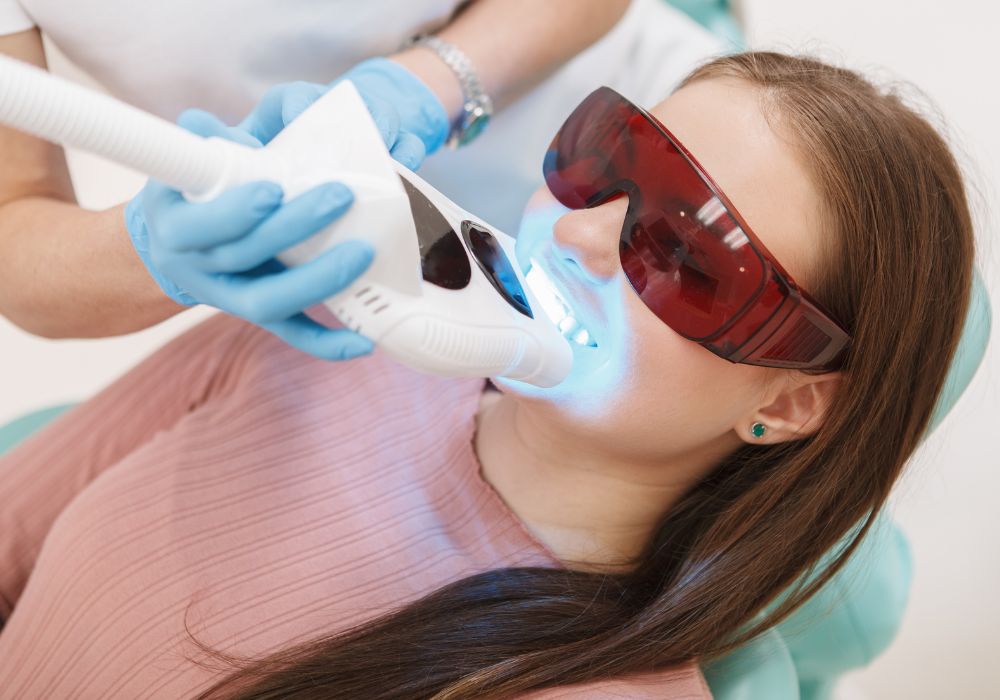Dentists commonly use peroxide-based whitening agents to whiten teeth.
The primary chemicals involved in professional teeth whitening treatments are:
1. **Hydrogen Peroxide**: This is the active bleaching agent in many professional whitening systems. It breaks down into oxygen and water, which helps to remove stains from the enamel by penetrating the tooth surface and breaking down complex stain molecules into simpler, colorless molecules.
2. **Carbamide Peroxide**: This is another widely used agent in teeth whitening. When carbamide peroxide is used, it breaks down into hydrogen peroxide and urea. Hydrogen peroxide then acts as the bleaching agent, while urea helps to stabilize the formula.
Differences Between Shop-Bought and Professional Treatments
1. Concentration of Bleaching Agents
– **Professional Treatments**: Dentists can use higher concentrations of hydrogen peroxide or carbamide peroxide.
– **Shop-Bought Products**: Over-the-counter products contain lower concentrations to ensure safety for unsupervised use .
Tooth whitening products and kits purchased in UK stores or online can legally contain only up to 0.1% hydrogen peroxide. This concentration is insufficient to produce any noticeable change in the color of your teeth.
Products with more than 0.1% hydrogen peroxide can only be legally obtained by dentists, as they have the potential to harm your mouth if misused. If you encounter tooth whitening products online that contain more than 0.1% hydrogen peroxide, avoid buying them. These products should only be applied by qualified professionals and could cause permanent damage to your gums, mouth and enamel, amogst other hazards.
2. Application and Customisation
– Professional Treatments**: These involve a consultation and assessment of your oral hygiene and teeth. Dentists will evaluate your teeth and recommend solutions for issues such as sensitivity. During this consultation, you will have the opportunity to ask questions and choose between different whitening options. These include:
– Home Whitening Kits: Custom-fitted trays with professional-grade whitening gel.
– In-Clinic Treatments: Instant treatments that can include laser whitening for faster results.
– Shop-Bought Products: These include generic whitening strips, gels, and trays that may not fit perfectly, leading to uneven whitening .
3. Supervision and Safety
– Professional Treatments: Dentists monitor the process, which reduces the risk of gum irritation and ensures the whitening agent is used safely and effectively.
– Shop-Bought Products: Lack of professional supervision can lead to misuse, increased sensitivity, and potential gum irritation.
4. Speed and Effectiveness
– Professional Treatments: These typically yield faster and more noticeable results, often within one or two sessions.
– Shop-Bought Products: Results are gradual and can take weeks to become noticeable.
FAQ on Teeth Whitening Options
Q: How long do the effects of teeth whitening last?
A: The effects can last from several months up to three years. This varies depending on the individual’s diet, lifestyle habits, and oral hygiene.
Q: Are there any side effects?
A: Some people may experience temporary tooth sensitivity or gum irritation. These effects typically subside after the treatment.
Q: Can all teeth be whitened?
A: Whitening works best on natural teeth. It does not affect crowns, veneers, fillings, or dentures.
Q: How often can I whiten my teeth?
A: It is generally recommended to wait at least six months to a year between treatments to avoid damaging the enamel.
Q: Is teeth whitening safe?**
A: Yes, when performed by a dentist or as directed by the product’s instructions, teeth whitening is considered safe. However, overuse can lead to enamel damage.
Q: Can teeth whitening damage my teeth?
A: Professional treatments are designed to be safe when used correctly. Overuse or misuse of whitening products, especially over-the-counter ones, can cause enamel erosion and increased sensitivity.
Q: How much does professional teeth whitening cost?
A: The cost can vary widely but typically ranges from £200 to £1000, depending on the method used and the dental practice.
Q: Can I get my teeth whitened if I have dental restorations?
A: While you can still undergo whitening, dental restorations such as crowns, fillings, and veneers will not change color, which may result in uneven coloring.
Whites Dental is one of London’s most trusted Dental Clinics offering services from two locations – The first being a few moments walk from Waterloo Station and the other a short walk from Paddington Station. The clinic offers a choice of teeth whitening options that include home and instant in-clinic whitening. They are also offering free initial consultations and can often accommodate same day appoinments.
